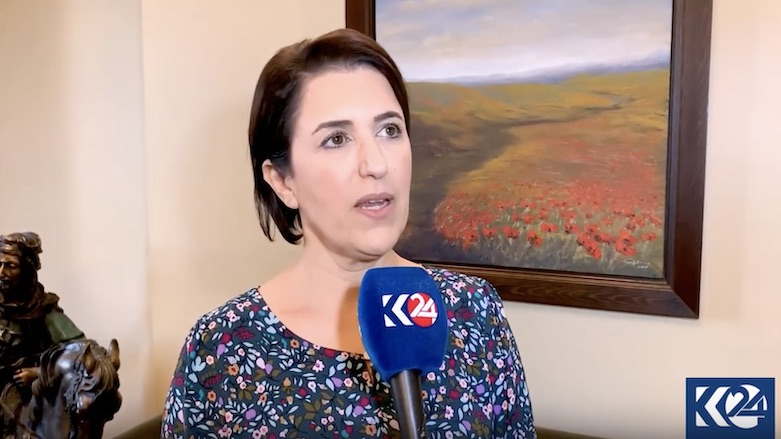KRG Envoy: Implement Iraqi Constitution, before changing it

WASHINGTON DC (Kurdistan 24) – Bayan Sami Abdul Rahman, the Kurdistan Regional Government’s (KRG) representative in Washington, spoke with Kurdistan 24 on the sidelines of the 30th annual Kurdish National Congress conference last weekend.
Abdul Rahman described her work with the US Congress, which centers now on the violence and instability in Syria and Iraq and trying to mitigate the negative impact on the Kurdish population.
In Syria, the focus of Abdul Rahman’s efforts is humanitarian: to address the refugee crisis and prod Washington to take a meaningful stand against ethnic cleansing. Regarding Iraq, she is warning against any changes to the Iraqi political system that would be inimical to Kurdish concerns.
Syria
Syria is very difficult because US President Donald Trump has proved himself determined to reach an understanding with Turkish President Recep Tayyip Erdogan and withdrawing US forces from most of northeast Syria.
That has resulted in ethnic cleansing and war crimes. Much of the US Congress opposes the Turkish assault, and the House of Representatives, where Democrats have a majority, has approved legislation sanctioning Turkey. But in the Republican-controlled Senate, the Majority Leader, Mitch McConnell (R, Kentucky), will not bring the issue to a vote, without White House approval.
Read More: US Diplomat: Turkish-backed militias committed ‘war crimes and ethnic cleansing’
Senior US military figures have expressed their opposition to the precipitous US withdrawal that preceded the Turkish assault. Even French President Emmanuel Macron weighed in, denouncing the decision, as he complained of Washington’s failure to coordinate with its NATO partners, including France, and its betrayal of the Kurdish-led Syrian Democratic Forces.
But nothing seems to change Trump’s decision, even if it was modified to keeping a residual US military presence around Syria’s oil fields.
Read More: Turkish attack on Syria could have been stopped: US official
Under such circumstances, the KRG’s influence is limited. “Many members of Congress have been outraged” by events there, she said. So “we’ve been talking” to them about “the humanitarian aspect of what’s happening in Syria.”
“There are 200,000 or 300,000 people who have been displaced. If they aren’t able to return to their homes soon, they will become refugees in Iraqi Kurdistan,” she added. “We already have one million people whom we are taking care of.”
Abdul Rahman also explained that in her work with Congress she is “highlighting the risk of demographic change,” as Turkish-backed militias drive Kurds out of their homes in the so-called “safe zone,” while Erdogan has repeatedly announced that he intends to settle large numbers of Syrian Arab refugees there.
Iraq
The protests in Iraq, continuing into their second month, can have significant consequences for the Kurdistan Region, and they are a major topic of Abdul Rahman’s discussions on Capitol Hill.
“We’ve been trying to give them a wider picture” of what is happening, “rather than just the daily news reports that they might get,” she explained.
Abdul Rahman noted that among the protestors, there are calls to rewrite the Iraqi constitution. Explaining that the “grievances of the protestors are legitimate,” the danger, nonetheless, exists that “they could be manipulated.”
“In what ways” does the constitution “need to be rewritten?” She asked. “For us in Kurdistan, the constitution is the one piece of paper that guarantees our place in Iraq, guarantees our status in Iraq, our protections, and our rights.”
“So let’s implement” the constitution first, “and let’s see if it works, frankly, before we try to rewrite it,” she affirmed.
Indeed, Iraq’s current constitution was written to guard against the depredations of dictatorship—like those Saddam Hussein’s regime routinely practiced. It was intended to decentralize authority, but that did not happen, partly because once the insurgency emerged, a strong central authority was deemed necessary to fight it.
The protestors, however, do not remember Saddam’s regime. They also seem to have little knowledge of the variety of political and legal systems.
Some protestors are calling for a change to a presidential system—which would further centralize authority and increase the potential for abuse. Indeed, it would be an extremely negative development for Kurds—and all other minorities in Iraq, both religious and ethnic.
Iran may be encouraging the demand for a presidential system. After all, Tehran might calculate that it could more easily exercise influence in Iraq through a Shia dictator than under the present system. The anti-government protests are also protests against Iranian influence, but those calling for a presidential system could, inadvertently, be playing into Tehran’s hands.
As Abdul Rahman observed, today’s protestors are Shia youth. The Sunnis protested when Nuri al-Maliki was prime minister, and he responded “in a very strong and perhaps negative way.”
And the Kurds have had their own protest. One could argue, she explained, that is essentially what the 2017 independence referendum was about.
“We were driven to hold the referendum,” she stated, “because we felt that Baghdad didn’t have our interests at heart, that it treated us as second-class citizens.”
“You could argue that in some ways, the referendum was an expression of that frustration. It was our protest.”
“We want a government and a parliament at the federal level that is representative of all of the people of Iraq, and for Iraq to benefit from the great wealth of the country,” she concluded.
“These are the ideas that we’ve been sharing with members of Congress.”
Editing by Karzan Sulaivany
